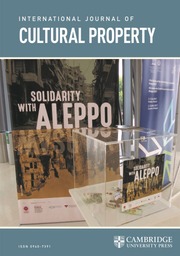Article contents
Pandemics and the role of culture
Published online by Cambridge University Press: 17 May 2021
Extract
Pandemics creep up on us slowly, and without our suspecting, while we are distracted. Likewise, human experience shows that they recede gradually and without our noticing. For those in the eye of its storm—those that experience their devastating impact firsthand without the hope of an end in sight—they touch and shape their daily lives and their societies, in big and small ways. History shows, that across millennia, pandemics throw a harsh light on existing cleavages in societies and shortcomings in their organization; fuel deliberation, agitation, and the search for new ideas; and accelerate or bring about change. There is no reason to believe the effect of the pandemic that is presently affecting every continent will not follow a similar path.
- Type
- Article
- Information
- Copyright
- © The Author(s), 2021. Published by Cambridge University Press on behalf of the International Cultural Property Society
References
- 2
- Cited by



